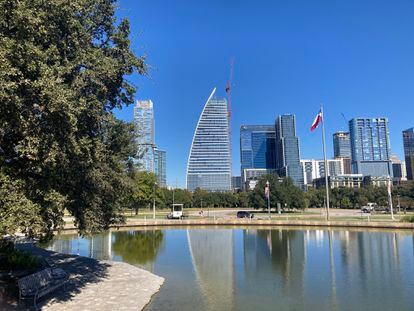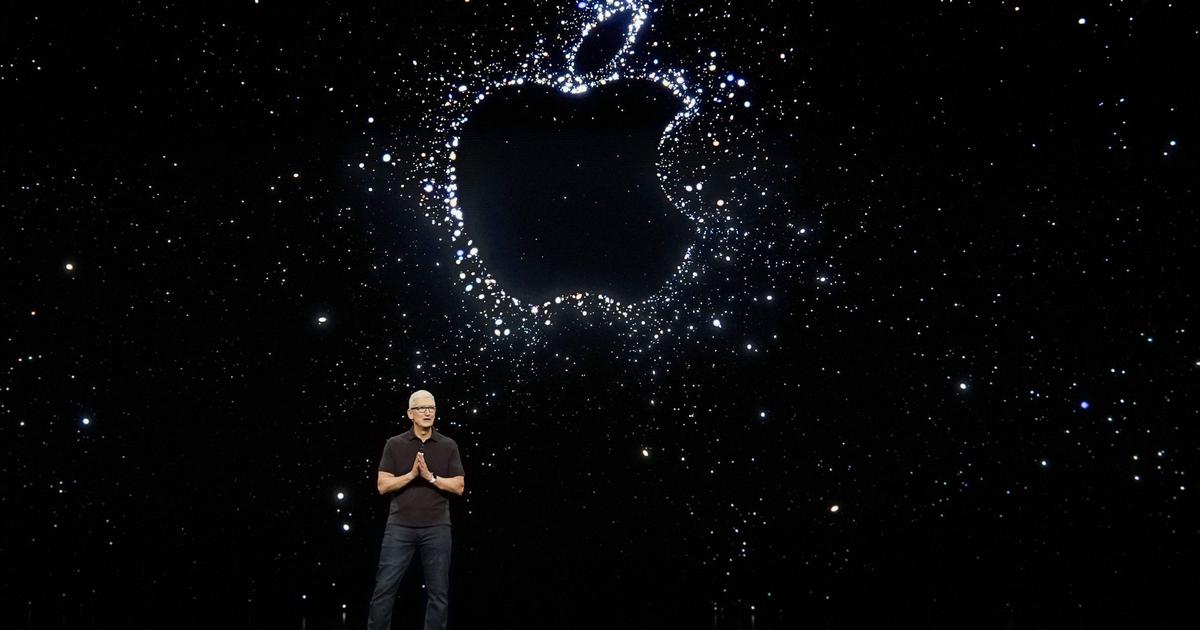California, the progressive land of opportunity, versus Texas, the conservative state of cows and oil wells. Between these two ways of life, the future of the United States is at stake. On one side, sunny California. On the other, the even sunnier Texas, whose large cities have increased their population in recent years thanks to a phenomenal exodus of workers from the technology industry. The historic war between these two poles, the two most populous states in the country (they have 70 million inhabitants and a GDP of 4.2 billion dollars), has intensified in recent times and the old saying that made its fortune in the eighties, " If you want to know the future of the United States, go to California ”, it is no longer as infallible as it used to be.
The transfer of the headquarters of the electric car company Tesla, of Elon Musk, the richest man in the world, who also changed his residence from Los Angeles to Austin, has drawn attention to an exodus that already has a name:
Texit
. Of the 265 companies that have left the high taxes of heavily regulated California behind in the past three years, nearly half have found a new home in Texas. The latest to join this trend is British chef Gordon Ramsay, who moved his North American offices to Dallas.
Some are as symbolic as Apple, which is building in Austin, the state capital, the second largest campus after the one it has in Cupertino, California. Its inauguration is scheduled for next year: it will house 5,000 employees on a 53-hectare site. And it is only the first step. Then it will grow to 15,000 workers.
Among the attractions offered by the Lone Star State is the fact that it does not charge income tax, has more lax regulation, cheaper labor and cheap rents. Both places are ideologically at the opposite end. California is a laboratory of the most progressive ideas in the country with generous social benefits, a strict control on the possession of weapons and policies to fight against climate change. Texas, on the other hand, is the only state in the union with its own power grid. It uses 67% more electricity, but the rate is cheaper. It is also the state with the highest percentage of people without health insurance (18.4%) and has a tough law that, in practice, almost totally prohibits abortion.
Apple engineer Leonardo Angulo, 25, outside the brand's Austin store last November.Antonia Laborde
One of the talents Apple employs in Texas is Leonardo Angulo, a 25-year-old Mexican. A computer analyst, he studied biochemistry and molecular biology and was seduced by what he calls the "Southern Silicon Valley." He has lived in the United States since he was four years old, but he maintains perfect Spanish. “
Big tech
doesn't stop at the reputation of the school where you studied, nor do they care about big titles. They are looking for people with some experience and a lot of interest, a decisive mentality and the ability to expand the world, ”he says in a restaurant in Austin. Many of his friends have left the San Francisco Bay area, one of the most expensive places in the United States, because their companies have opened offices in the Texas city or because the pandemic has revealed the benefits of telecommuting.
The exodus from California to Texas hit one of its peaks in 2018, when some 80,000 people moved between states. The figure, which was repeated in 2019, was the highest in the last 13 years. The price of the house pushed the majority. In August, the value of a single-family home in California reached a record $ 827,000 on average, 17% more than in 2020. 57.8% of homes cost more than $ 500,000. In Texas, just 7.8%. Most sell for less than half that value. In San Francisco, the birthplace of technology, 72,000 people have left since the beginning of 2020, a figure eight times higher than three years ago.
With the pandemic, many realized that they could have more space in states like Arizona, New Mexico and Texas for the money they were paying.
“House prices started to rise in 2012, and migration to Texas grew by the same amount a couple of years later,” explains William Fulton, director of the Urban Research Institute at the University of Houston.
Due to this cascade of desertions, California lost population for the first time in the last decade.
So much so that it has one less seat in Congress.
Texas, on the other hand, has seen its census grow by 40%.
So now you have two more seats on the Capitol.
The change is not only quantitative. Texas leads the growth of the Latino population in the US Hispanics represent more than half of the four million new Texans born between 2010 and 2020. They are young people who are more educated than their parents, as well as ethnically diverse. For every white resident Texas has welcomed over the past decade, there are three new black, three Asian and three multi-racial neighbors. Forty percent of Houstonians, for example, are under the age of 24. Although California, which is close to 40 million inhabitants, is the most populous state; Texas, with 30 million, is growing at a rapid rate. By 2050 it will reach 50.4 million people, according to demographic projections.
Oracle, HP Enterprise or Toyota, as well as Samsung, which is building a factory, have contributed to altering the face of their large cities.
The streets of Austin reflect it.
The center still smells of barbecue and the taverns continue to offer
live
country
music
, but now skyscrapers are also being built and the diet of the restaurants has incorporated sushi, poke or tofu.
One of those skyscrapers is a Google tower that will open its doors in 2022. The building's design simulates a sailboat, a nod to the new winds blowing.
Tower that Google is building in Austin.
Its inauguration is scheduled for 2022. Antonia Laborde
Austin is the second fastest growing city in the United States, only behind Dallas-Fort Worth also Texas.
There, employment rates have improved 50% since 2000. In Dallas and Houston, 31%, three times more than in Los Angeles.
As if that were not enough, California was more affected by the forced brake of the pandemic, since its sanitary measures were among the strictest, while the Republican fiefdom remained open for the most part and was among the first to reactivate the economy.
North of Austin, a progressive oasis in a state that has not elected a Democratic ruler for 20 years, is the Domain.
Neighborhood conceived 15 years ago as an unpretentious commercial area, today it houses so many offices and residential buildings that it is already known as "the second center" of the city.
There are upscale shops, trendy cafes, and
coworking
spaces
.
There are no children or the elderly to be seen.
A group of young people work on the terrace of a Starbucks in Domain, one of the new neighborhoods of Austin, grown up in the heat of the technological boom.Antonia Laborde
California academic Kenneth Miller, author of
Texas vs. California: A Story of Your Fight for America's Future
(2020) argues that lawmakers in his state are not as concerned as they should be. "What is happening is that wealthy people can afford to live here, and the State provides economic aid to the poor, but the middle class has been crushed in this economic system," he warned in a telephone conversation. And it highlights a paradox: For every company that leaves Silicon Valley, a new one is created. "It is impressive as a business incubator, and as long as that continues, the state will continue to be healthy economically, its GDP is growing faster than that of Texas."
Hany Fam is CEO of Markaaz, a technology company that groups small businesses. It's one of many companies that have swapped Los Angeles for Austin in the last year. “The flight of companies is very real. The quality of life, the level of talents and the availability of these thanks to the University of Austin [50,000 graduates in 2020], makes the city attractive. It is a community that supports itself, and that is not the case in California, "he told EL PAÍS at a business meeting held in Austin in November. To his criticisms he adds an excessive bureaucracy and an income tax of 13.3%, the highest in the country.
California is the most regulated state. It has 518 state agencies, boards, and commissions. A survey of executives this year by
Chief Executive
magazine found
that Texas is considered the best state of the 50 to do business. California, the worst. And the
big tech
moves
are the first piece of the domino. “With them, come the companies with which they do business. They want to be close and continue to provide them ”, Stacey Saller, regional manager of Spaces, a company dedicated to renting offices, points out at the business event. “They are coming with all of their employees and not just from California. We have clients from the United States and from different parts of the world ”, he adds.
Stacey Saller, regional manager for Spaces, an office rental company, at a conference in Austin in November.Antonia Laborde
Elon Musk's arguments for moving his electric car factory to Austin were that California is "stuck" and that his employees were having a hard time paying for housing.
It must also have weighed the $ 2 billion in taxes saved by moving, according to Bloomberg.
The surge in new tenants, however, is increasing the cost of living in Texas. Angulo, for example, had to leave Domain because of the rent hike. “It is growing a lot. The constructions seem to have no end ”. The professor of urban planning and economic development at the University of Texas, Steven Pedigo, warns that if the State fails to control the rise in housing prices and improve transportation, the competitive advantage over California will be lost. “Do we want to turn Austin into Silicon Valley 2.0? Here there is a lot of concern about that, because it is an option ”, considers the academic, skeptical of the boom of the companies that are arriving. He believes that "at some point Texas must create its own companies and not just be a recipient of expansions." The greatest challenge, in his words,is that conservative policies continue "out of date" with the wishes of the new demography.
The new profile of residents represents a conflict for a hyper republican state. "For many years, business has been in league with conservative states for economics," says author Miller. "Now that the employees of these companies are more and more progressive it has become a problem for the CEOs." Laws such as the restriction of abortion and the right to vote, pushed by deeply Republican congresses, cause unrest among workers, who will transfer them to their bosses and these, in turn, to legislators.
In 2017, Tim Cook, Apple's CEO, was active against the ban on transgender bathrooms in Texas, until the state Capitol gave way.
If new neighbors and tech giants follow this path, the transformation of Texas will be faster than it already is.
If anyone wants to know what the United States will be like in the future, visit California.
But make a stop in the Lone Star State first.



/cloudfront-eu-central-1.images.arcpublishing.com/prisa/OD3CEWF6TJG4FH7RLIGMZ2UOXM.jpg)





